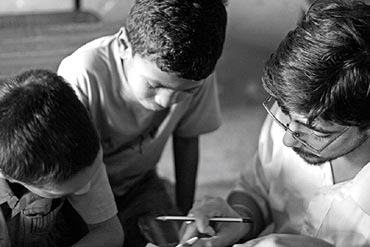
A lot of youngsters these days are willing to take a break from studies and work to teach underprivileged kids. Fellows of Teach for India share their experience on how the activity helped them bag their dream jobs.
When Vipul Saha first joined Teach For India, he looked at it as just a good career move.
"But within six months, a service attitude kicked in and I was obsessed with teaching my children," says Saha, who is prepping to join the Harvard Graduate School of Education for a Master's degree.
A Fellow from TFI's first batch in 2009, Vipul recalls how he was often "frustrated and broke down" in the early stages, sometimes wishing he had entered the corporate world, instead. But two years down the line Vipul plans to return to his village and start a school there, after his degree.
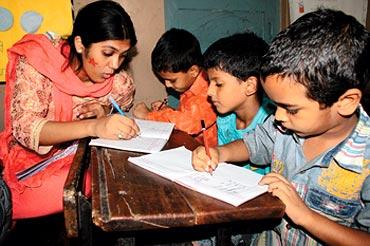
Teach for India's parent movement 'Teach for America' kicked off in 1989. The idea behind the movement is to eliminate inequity in education by placing Fellows in low income schools for two years.
Underprivileged children who did not formerly have access to quality education will gain it, and teaching these children will create a pool of young people sensitive to important issues, and lifelong leaders, across varied sectors.
In India, the Fellowship provides resources and training, and encourages Fellows to employ innovative teaching techniques.
During the two years, Fellows gain important knowledge and experience about India's educational system and its challenges, which enable them to provide solutions to problems faced within their classrooms and school communities.
This year witnessed the graduation of TFI's first batch of Fellows and they have also expanded to Delhi. They received 4700 applications for 300 teaching positions, and the network now reaches 13,500 students through 130 schools!
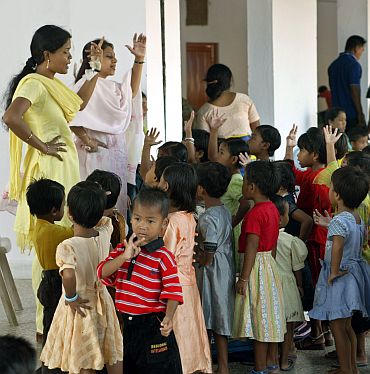
In the course of two years, Fellows have seen children go from average to brilliant, shy to confident.
Parth, a second grade student was very playful and would not study.
With the help of his teacher Ronald Joseph in Pune, he can now fluently read passages from fourth grade textbooks. Reaching out to families of their students is part of the job. Often, this is to ensure that their students are not hindered in their education.
"Nine-year old Preethi is a brilliant girl, but her parents wanted to move back to their village and marry her off. I was able to talk them out of it," says Vipul.
What's more is that he secured a full scholarship for her at the Sahyadri School in Maharashtra upto Class 10, and also tried to find better paying jobs for her parents.
Similarly, Anchal Taatya from Patna who joined TFI straight out of college, is a teacher and friend to his students.
"I constantly communicate with parents, about every small achievement of their children. If a child misses a day of school, I make sure I find out what happened," he shares. And that care remains the core of the fellowship.

Apart from imparting education, TFI recognises the other deficit in the country -- that of productive leaders. Engineer Prithvi Acharya, TFI's campus ambassador from MS Ramaiya Institute of Technology, Bangalore, has been selected for the 2011 batch.
"TFI's approach is holistic. They take care of the personal development of the Fellow as well. They work on building us into leaders throughout the two years," he says.
In the second year, Fellows are required to take on a community project.
For instance, Vipul set up a 'buddy system' between a school in the UK and his school in Pune. Children of both schools wrote letters to each other and exchanged gifts.
"The children became very enthusiastic about improving their English," he says.
Within the programme, Fellows can choose to intern abroad. Anchal, who wants to be social entrepreneur in the field of education, participated in Teach For China earlier this year.
"It was a great learning experience and I got to apply many of my skills from TFI to help the team in China," he shares. Prominent people deliver talks and encourage the Fellows. Vipul's interaction with actor Amir Khan was a dream come true!
"Amir's role as a teacher in Taare Zameen Par had a deep impact on how I perceive the world of children and the crucial role of a teacher in shaping young lives," he shares.
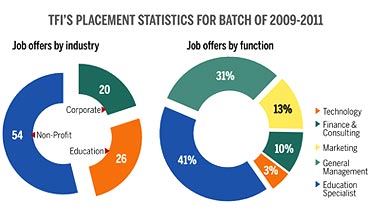
Placements on offer
According to the organisation, TFI's placement cell works to forge partnerships with corporate and non-profits with an eye on placements.
Around 68% out of the 80 Fellows in the first batch have gone on to work in the social sector. Some have joined CSR departments and others have joined non-profits.
A few are planning their own ventures in the field now. At TFI's recently concluded Career Fair, over 30 organisations recruited 2009 Fellows in a range of leadership positions as education specialists, and functions like marketing, general management, finance & consulting and technology.
Job offers comprised 54% from non-profits, 20% from the corporate sector and 26% from the education sector, and organisations included ICICI Bank, Mckinsey, Ernst & Young, NIIT Foundation, iDiscoveri, ICICI Foundation, Give India, United and Riverside Schools.
Two years too many?
Shilpa KS from Bangalore is finishing her undergraduate degree and was interested in the TFI programme but did not take it up. "I can't commit myself for two years. If was part-time I would have taken it up," she says.
While this may scare some people away, it acts as a filter and thus the programme is left with only the most committed Fellows.
Shaheen Mistri, Founder and CEO of TFI explains that children need consistency, and this can be given to them by a personal relationship with their teachers and a commitment to finish the two years with the same students.
Parents in the process
When children aspire for a career in the sector parents tend to worry as they don't often see tangible benefits. TFI Fellow Prakhar's parents were also initially skeptical -- they wanted him to do an MBA and join an MNC.
But he refused to sit for placements after his engineering degree!
"Once I started sharing photos of my work, they became convinced and now they support me," he shares. TFI has identified the importance of parents to the process. This explains why their website has a section devoted to interacting with parents.
"A good teacher is a good leader. And all of us must learn to lead"

She is no stranger to the field of education and started her first NGO Akanksha, at the age of 18. Akanksha continues to work actively to impart education to underprivileged children.
Twenty years on, the soft-spoken lady shares, "Everybody needs to get involved. Parents need to stand up, children need to contribute."
According to Shaheen, local governments have cleared permissions and welcomed TFI into government schools.
"We have even been invited to conduct teacher and head master trainings in these schools," she says.
So, how is TFI different from other NGOs imparting education to underserved communities?
"We believe that a good teacher is a good leader. I was just so excited at the prospect of TFI bringing young people to work together. Ten years from now we hope to see a completely different landscape of change in education," she says.
Hope for the future and faith in the present keeps her going. In her poem, she sums up the belief of the movement, "All of us must learn to lead/ To understand what India needs/ For all of us are in this fight/ To make things for each child more right."
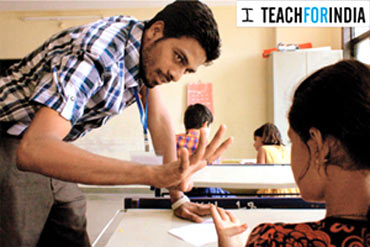
'Ronnie Bhaiya' (as he is known among his students), says that the performance of his students has drastically improved since he first started teaching them.
Perhaps this is because of his approach; this year's theme for his class is Bollywood. There is a 'lighting crew' to ensure that the class doesn't waste electricity and a 'props team' that cleans the board and gets the chalk.
Students move up or down based on their performance, with the end goal of being 'superstars'. And when he wants to get their attention, he shouts "Lights, camera, action!"
Ronald's work often takes him to the families of his students.
Hari Om, one of his students, was always very withdrawn in class. When Ronald sat down with Hari's parents, he realised that the child was under a lot of pressure -- he was the only boy in his joint family and people kept telling him that bread winning responsibilities would soon be his.
With Ronald's help, the family eased off the burden on Hari. Today he is class monitor!
In his brief summer break Ronald worked in a village school in Andhra Pradesh. He helped in curriculum development and teacher training. He is also compiling a CD of the best educational practices he and other Fellows have come across, and he plans to send this to non-TFI schools.

Programme: Teach for India Fellowship
Duration: Two years
Minimum qualification: Graduation
Language requirement/ Medium of instruction: English
Age: 20-35 years
Locations: Mumbai, Pune, Delhi
Stipend: Rs 15,000 per month + housing, school supplies
Selection procedure: Online application + Essay
Website: www.teachforindia.org